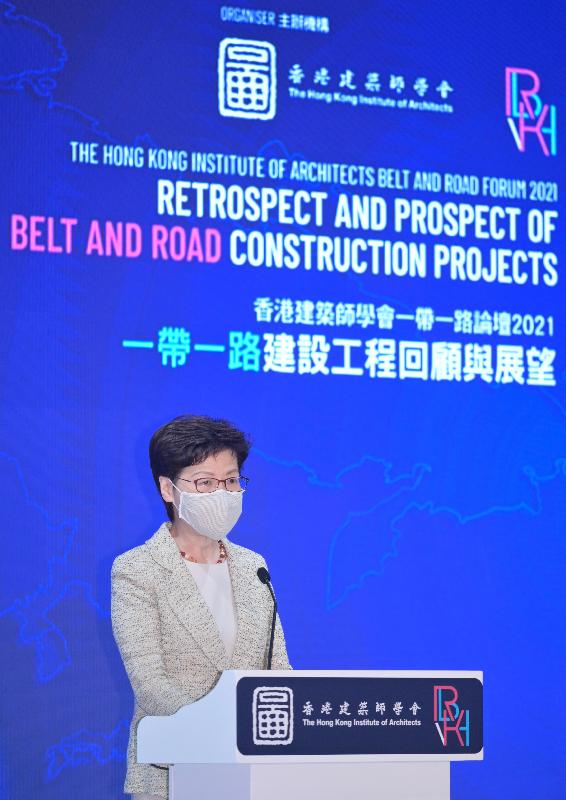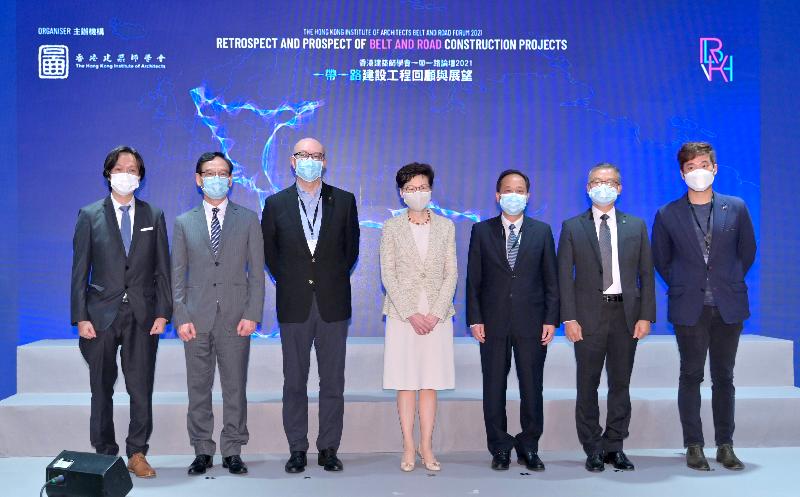Following is the speech by the Chief Executive, Mrs Carrie Lam, at the Hong Kong Institute of Architects (HKIA) Belt and Road Forum 2021 today (April 16):
Donald (President of the HKIA, Mr Donald Choi), K K (Chairman of the Construction Industry Council (CIC), Mr Chan Ka-kui), Rita (President of the Architects Regional Council Asia, Ms Rita Soh), Mr Xiu (President of the Architectural Society of China, Mr Xiu Long), ladies and gentlemen,
Good morning.
I'm delighted to be here with you today at the CIC-Zero Carbon Park, and to address those of you taking in this invaluable summit online – from Hong Kong, the Mainland of China and Belt and Road economies from all over the world.
This event, supported by the Government's Professional Services Advancement Scheme (PASS), was scheduled to be held months earlier, but like many other events had to be put back due to the pandemic. I am glad that the event is held today, and hope it is yet another sign that we are entering a new stage in Hong Kong's fight against COVID-19. Incidentally, I announced in a press conference earlier this week that we are probably coming to the end of the fourth wave that has haunted us since November last year. Our multi-pronged strategy has worked to minimise imported cases, while our redoubled testing and contact tracing efforts have suppressed the spread of the virus. With the improved situation, as well as our enhanced capability on several fronts, I have mapped out a new direction in our anti-epidemic efforts, leveraging on the concept of "vaccine bubble".
As you are aware, and I hope many of you by now have taken the jab, the Government's vaccination programme is well under way. Taking into account the private clinics which have partnered with us, we have literally thousands of locations where every Hong Kong resident aged 30 and over, and soon to be lowered to 16 and over, can take their jab. The steady supply of vaccines as well as the infrastructure we have put in place to administer vaccination are indeed the envy of many places. What we need to do now is to accelerate the vaccination progress. In this connection, I would like to thank the construction industry, architects included, for its strong support in the fight against COVID-19, including putting in place stringent measures in construction sites and arranging regular testing for staff and workers. I look forward to the same support from the industry in terms of vaccination. For your good health and that of your family, friends and loved ones, I encourage you to get vaccinated as soon as possible. Our flourishing future depends on a healthy and safe Hong Kong.
Every cloud has a silver lining. In fighting the pandemic together, I believe we have come to a much fuller, and more personal, appreciation of the Belt and Road's "Five Connectivities": policy, infrastructure, trade, finance and people – and not merely acknowledging them as individual elements but appreciating their inspired interaction. This Forum will focus on those mutually beneficial interactions. It will also showcase the success of Belt and Road construction projects since this far-reaching, multilateral and multi-level initiative began eight years ago. Later this morning, our Belt and Road Commissioner will provide a considered stock-taking of our Belt and Road measures. That timely review comes as we look ahead together for the wide-ranging opportunities within the Belt and Road.
If the past is any indication, the future looks good. To date, China has signed more than 200 co-operation agreements with some 140 countries and 31 international organisations under the Belt and Road Initiative. Last year, despite the pandemic, the contract value of newly signed overseas engineering projects of our country came in about US$255 billion. China's non-financial outward foreign direct investment in 58 Belt and Road economies rose 18 per cent, year on year, to nearly US$18 billion. As one Mainland official has pointed out, these encouraging figures are attributable to China's quick economic recovery from COVID-19, the country's contribution to the global economic recovery, and the solid foundation for co-operation laid by both China and Belt and Road economies over the past years.
Hong Kong has much to look forward to in the Belt and Road Initiative, thanks to our "One Country, Two Systems" framework and deepening economic integration with the Mainland. Our country's 14th Five-Year Plan, approved by the National People's Congress last month, supports the continuing enhancement of our status as an international hub for finance, trade and logistics. The Plan also looks to Hong Kong as a centre for innovation and technology, for high-end, high-value-added services, and as an East-meets-West hub for art and cultural exchange. Let me add that Hong Kong's singular advantages have placed us in the enviable role of facilitator and promoter between China and the countries of the Belt and Road.
Our professional services sector is among our core strengths in Hong Kong's active participation in the Belt and Road Initiative. Indeed, the construction industry, as pointed out by Donald, has a long tradition of taking its expertise out to the world. Hong Kong construction professionals were involved in railway construction in Southeast Asia as far back as the 1980s. Our architectural, design and construction professionals have long adopted international standards in terms of design, technology, operations, management and other protocols and quality-assurance standards.
I know that the Hong Kong Institute of Architects has always been encouraging its members to outreach and implement their ideas in the international arena. In particular, the Institute established an award for projects outside Hong Kong under its Annual Awards since 2000, and noted that more and more projects from Belt and Road economies were shortlisted in recent years. The Institute also promoted the Hong Kong-style "Architects' Professional Full Services" to Mainland China and Belt and Road economies in recent years through sharing sessions. Today's forum is another example of the Institute's efforts. I am delighted to say that you have my Government's full support in this regard. Not only is this forum supported by the Government's Professional Services Advancement Support Scheme, many government bureaux and departments are also joining various professional bodies in supporting today's event.
So, yes, we have the talent and the experience to flourish in the Belt and Road's continuing progress. Having confronted professional and personal hardship these past two years, it's time now for us all to turn crisis into opportunity. I recall State Councillor and Foreign Minister Wang Yi speaking last June at the Video Conference on Belt and Road International Cooperation in Beijing. He reaffirmed China's readiness to work with international partners to make the Belt and Road a model of co-operation, health, recovery and growth. He promised a bright future through Belt and Road collaboration in infrastructure and co-operation among the economies and peoples of the Belt and Road. I trust you are ready to seize the opportunities there for Hong Kong and for all of you.
No less promising is our backyard: the Guangdong-Hong Kong-Macao Greater Bay Area. To take full advantage of the boundless prospects the Greater Bay Area offers, my Government has long been liaising with Mainland authorities, working to promote mutual recognition of professional qualifications and to realise preferential policies. The effort is paying off, I'm pleased to say. Hong Kong construction companies and professionals can now start businesses and provide services in the Greater Bay Area through a simple registration system. And we are exploring the possibilities of having Hong Kong companies bid, exclusively, on select construction projects in the Greater Bay Area. Beginning as a pilot project, it can only show us the way ahead – to a hugely expanded market eager for Hong Kong expertise.
We will also explore the creation of an Architect Responsibility System in project management throughout the Greater Bay Area. It will be good for the built environment of the Greater Bay Area, good for Hong Kong and for the professions including the architects.
Hong Kong will actively participate in both the Belt and Road Initiative and the Greater Bay Area development, and I can tell you that the Central Government is looking forward to our contribution, putting trust in our system, our economy and the sectors, businesses and professionals who have made Hong Kong the global bridge between the Mainland and the business world. We are most prepared than ever to respond to that trust, and the opportunities that flow from it. That's thanks, in part, to the enactment last June of the National Security Law and the stability it has brought to Hong Kong, the confidence it has instilled in our economy and our community. It's thanks, as well, to our new electoral system, made possible last month by the Standing Committee of the National People's Congress in its amendment of Annex I and Annex II to the Basic Law.
We have already submitted the local legislation to implement the amended Annex I and Annex II to the Legislative Council for scrutiny. Under the improved system, a reconstituted Election Committee will play a central role, with 1 500 members from five sectors broadly representing Hong Kong. In the "professions" sector, 30 seats will be reserved for the "architectural, surveying, planning and landscape" sub-sector, ensuring that your voices will continue to be reflected. And for the first time, the Hong Kong Institute of Architects' President together with the chiefs of other professional institutions will be made ex-officio members of the Election Committee.
I look forward to your staunch support for the improvement to the electoral system. It will ensure the faithful implementation of "patriots administering Hong Kong" and "One Country, Two Systems", which is very essential for the long-term stability and prosperity of Hong Kong. In terms of immediate effect, it will put an end to the chaotic situation in the Legislative Council that we have seen in recent years. I have made it clear that my Government will continue to invest in infrastructure despite the fiscal stringency. Our annual capital works expenditure in the coming years will exceed HK$100 billion, while total construction output is expected to rise to about HK$300 billion. That will create more than 300 000 employment opportunities. With the Legislative Council returning to normal, I am confident that we will be able to proceed with these projects in an efficient manner.
My thanks to the Hong Kong Institute of Architects for organising this international forum, and for giving me this welcoming opportunity to speak to you today. I wish you all the best of business and health in the coming year. Thank you very much.
Follow this news feed: East Asia







